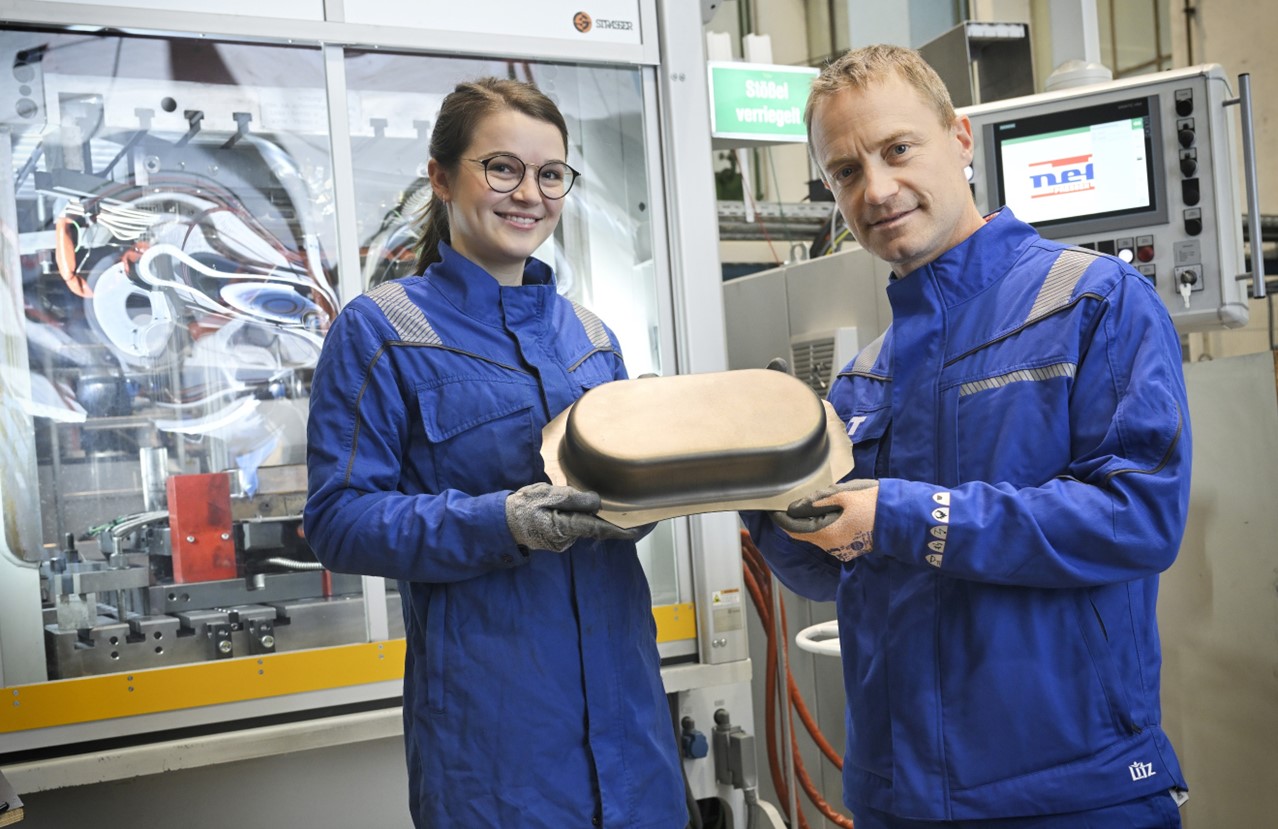Technology leap in titanium sheet metal forming
As part of the ProMetHeus subproject “Titania”, the LKR Leichtmetallkompetenzzentrum Ranshofen of the AIT Austrian Institute of Technology recently achieved a technological breakthrough in the forming of titanium sheets (Ti-6Al-4V). A novel deep-drawing process below 500 °C has resulted in significant energy and time savings. A patent for this process is expected to be granted shortly.
Challenges facing the aviation industry and the importance of titanium
The aviation industry is facing major challenges as a result of the Green Deal. In addition to reducing CO₂ emissions, the industry must develop more environmentally friendly production technologies. Titanium is indispensable in the aviation industry because of its unique properties (e.g. high specific strength, corrosion resistance, low density), thus it cannot be replaced by other materials that can be produced in a more energy-efficient way.
However, the processing of titanium, in particular of the widely used α-β titanium alloy Ti-6Al-4V, is extremely demanding. Conventional forming processes are energy-intensive and complex. In particular, so-called superplastic forming (SPF) requires high temperatures (e.g. 840-930°C for Ti-6Al-4V) and low forming speeds. In addition, long exposure to high temperatures in air causes a brittle, oxygen-rich phase (“α-case”) to form on the surface, which must be removed by elaborate chemical etching or blasting.
LKR-Innovation: Efficient deep drawing process below 500°C
A major focus of the LKR Leichtmetallkompetenzzentrum Ranshofen is on the reduction of process costs, time and energy consumption in order to support CO₂ reduction targets in light metal technology. These goals are being pursued in the COMET project ProMetHeus / subproject Titania, which aims to improve titanium sheet forming.
LKR developed an innovative hot stamping process demonstrating that α-β titanium sheets are highly formable at temperatures below 500 °C. This method enables the use of hot-work tool steels as forming tools – instead of expensive nickel-based alloys, which are required for temperatures above 600 or 700 °C. This further reduces overall costs and paves the way for industrial application.
Since isothermal forming is not successful at 500°C or below, the process involves preheating the sheet to a temperature below the SPF temperature before transferring it to the press.
First successes and patenting
Initial trials with a specially designed hot-work tool steel tool led to the successful forming of a test component with a depth of 44 mm in 2022. Based on these promising results, LKR filed an Austrian patent application about a year before the start of ProMetHeus-Titania and filed a PCT patent within the priority period. Further optimizations in the project confirmed the robustness of the method, achieving a drawing depth of 68.5 mm – the maximum depth of the test tool.
This outstanding result implicated that the formability of Ti-6Al-4V with our process has great potential for a wide range of applications.
Further development and industrial advantages
As part of the project, the preheating time, preheating temperature and deep-drawing temperature were further reduced. Several trials with Ti-6Al-4V sheets of different surface finishes, provided by our industrial partner voestalpine BÖHLER Bleche GmbH & Co KG, showed excellent reproducibility. It is particularly important that our process also works successfully with rougher sheet surfaces. This reduces the amount of grinding required and thus offers a significant advantage for industrial application.
The mechanical properties are also promising: an elongation at break of over 10% was achieved without additional heat treatment after the deep-drawing process. This suggests that multi-stage forming processes in more complex tools will be possible in the future without intermediate heat treatment. Initial trials with a two-stage forming process have already been successful.
Another decisive advantage of our process over conventional Ti-6Al-4V forming methods is the absence of the brittle α-case layer on the component surface. This is due to the comparatively short high-temperature exposure, which thermodynamically limits diffusion processes and oxygen absorption into the α-titanium.
Georg Kunschert, the project manager of ProMetHeus-Titania, summarizes: “Our novel technology offers numerous improvements over existing Ti-6Al-4V forming processes and represents a real success story within the COMET project ProMetHeus. The results to date provide a promising basis for the industrial commercialization of this innovative titanium forming process – with great potential for industries such as aerospace, chemical equipment manufacturing and medical technology.”



